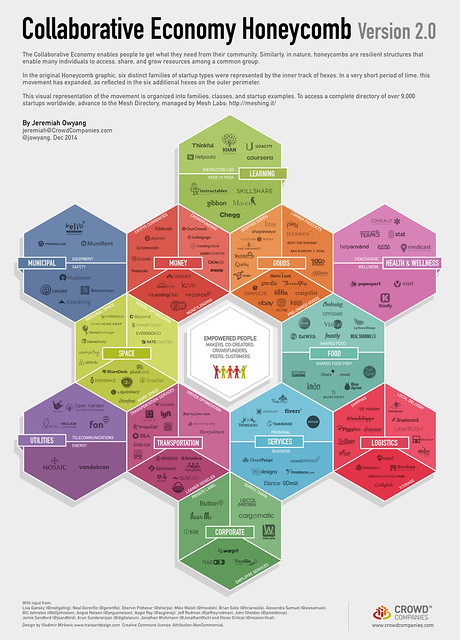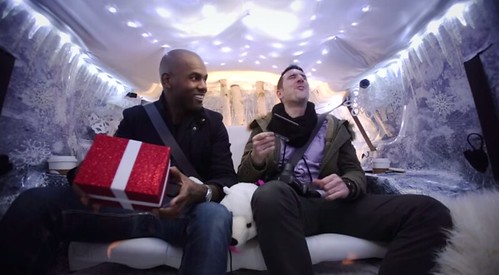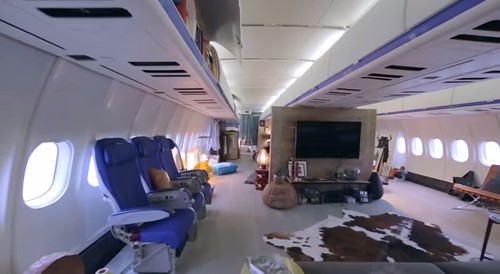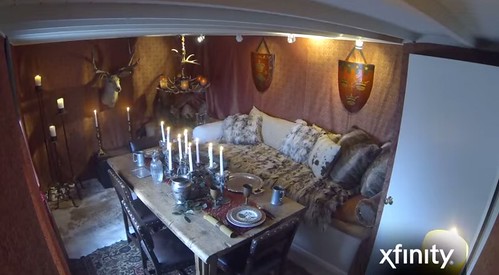It pays to share, as the crowd shares your brand for you.
Marketers first adopted the internet and then social media. The next digital phase is the Collaborative Economy. What’s that? If you’ve heard of Airbnb, Uber, Lyft, Kickstarter, Indiegogo, and the Maker Movement, this is the Collaborative Economy.
Just as social media enabled people to create media and then share media, in this next phase, the Collaborative Economy enables people to create their own physical goods as well as share their existing physical goods. In both of these examples, they are using digital technologies to make the sharing happen.
This following honeycomb graphic of the Collaborative Economy clearly illustrates the many different industries that are being impacted.

View full-size image.
Crowd Companies has been tracking this movement and is aware of at least 150 leading brands that have recognized the need to adopt and embrace the Collaborative Economy, and we have a Google spreadsheet to track how brands are using the concept in marketing and more. Each of them has acted in some way to deploy shareable products, host marketplaces, and work with makers to innovate. Here are eight companies that clearly demonstrate what marketers can do to adopt this collaborative revolution and to promote the sharing concept.
1: MasterCard and Lyft
Mastercard partnered with Lyft to extend its “Priceless” marketing campaign during the Christmas holiday. It decked out the interior of Lyft vehicles in Christmas decorations and handed out gifts such as cookies and concert tickets.
2: KLM and Airbnb
KLM customized a private plane for use as a unique Airbnb experience, giving a whole new meaning to “flights and accommodations all in one place.” To be fair, the plane didn’t actually fly anywhere. It was the accommodation. And it was luxurious to say the least. Three lucky families got to spend a night in the stylish apartment-in-a-plane equipped with a host of amenities not available in even a luxury hotel room.
3: Comcast and Airbnb
Comcast created three unique Xfinity Watchathon Week Airbnb properties. Families in San Francisco, Chicago, and Baltimore spent an entire week in selected Airbnb properties whose interiors were redecorated to match the sets of Game of Thrones, Boardwalk Empire, and The Wire. Not only did guests watch their favorite series, they were immersed in it.
4: Ghirardelli and Lyft
The lovetacular @AskLyft Help me win #lyftlove #ghirardelli @LoveGhirardelli pic.twitter.com/Nx4gp3n1YB
— soraya ghoudsifar (@sorakita12) February 10, 2015
Ghirardelli sponsored a Valentine’s Day contest and sweetened the ride for some lucky Lyft passengers. Every Lyft rider in San Francisco enjoyed a car packed with free Ghirardelli chocolates. One lucky passenger and a loved one won a getaway in San Francisco, including a two-night stay in a fancy hotel, unlimited Lyft rides, an exclusive tour and shopping spree at Ghirardelli, and of course, lots of chocolate. Sweet!
5: Citibank and the City of New York
Citibank sponsors a New York bike sharing program, which means its brand is pedaled all over the city. With the full backing of the New York Department of Transportation and the sponsorship of Citi, thousands of on-demand bikes and hundreds of bike stations are available and easily accessible. Increasing consumer demand is now prompting expansion to neighborhoods north and east of Manhattan.
6: MADD and Uber
MADD partnered with Uber to prevent drunk driving on St. Patrick’s Day. According to a report issued jointly by MADD and Uber, “It is estimated that every 52 minutes someone is killed in a drunk driving crash.” Uber and Mothers Against Drunk Driving are working toward a world where more options empower more people to make the right choice — where a safe, reliable ride home is always within reach.
7: Honda and Indiegogo
Honda and Indiegogo partnered to preserve iconic American drive-in theaters. The people at Honda figure that without cars there would be no drive-in theaters, so it made sense for them to launch an Indiegogo campaign to engage the crowd in an effort to help save the 368 remaining icons of a bygone, but missed, era.
8: Nordstrom and Etsy
Nordstrom features Etsy products, including home decor items, clothing (even bridal gowns), and accessories. Perhaps the next Vera Wang will be discovered at Nordstrom. There are currently 15 Etsy makers whose products are cataloged by the upscale retail giant. This is a model of corporate marketing vision and resilience embracing the Collaborative Economy for the benefit of all concerned.
Concluding Remarks
Because of the increasing popularity of sharing startups, more and more businesses are considering how they can join in on the “sharing” — either through individual projects or by partnering with other brands. And the industry is moving fast as more and more entrepreneurs come up with business models that build upon the Collabortive Economy model and compete with traditional commerce models. If you want to keep up, consider how your brand can be more “sharing” and how you can facilitate sharing within your customer base.










Jeremiah – great piece. Just to add my ten cents™ worth based on experience as CEO of a European marketing communications company: The collaborative economy works only if it™s based on trust, the trust that only reputable, involved brands can deliver. Otherwise you™re not marketing with the crowd, you are preaching at them. Plenty of companies have fallen foul of this including Uber whose PR problems at the beginning of this year stemmed from an apparent willingness to use data collected in ways that made customers feel uncomfortable. Collaboration is a trade- off: done well it™s beneficial and generates trust on both sides.